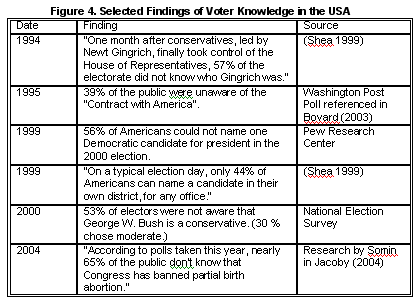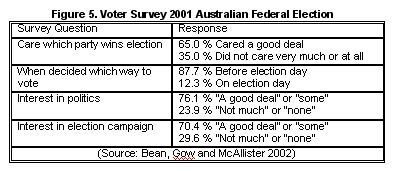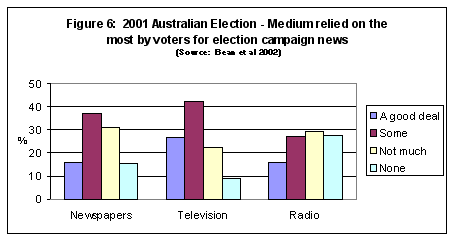
By comparison, Figures 5 and 6 show some relatively high scores on Australian voter knowledge and interest, which indicates that some synthesis, analysis and comparison of candidates and policy issues must have been undertaken by voters.

Advertisement

The above data show a generally high level of engagement in political issues by the majority of voters, but what of the depth of knowledge? Ian McAllister undertook a study in 2001 leading him to suppose that, “by any standards, levels of political knowledge in the electorate are low.” Based on analysis of a survey of voters in the 1997 Australian federal election he found that the median voter could only answer correctly two out of seven factual statements about political institutions.
But not all of McAllister’s observations were that damning. He also asked respondents if they knew the name of their federal member prior to the election. Seventy per cent correctly gave the name of the member and 61 per cent the correct name of the party. This is an interesting finding, because it appears not to be consistent with the experiences in the US. Figure 4 shows only 44 per cent of Americans could name an election candidate. This is not exactly the same question, but close enough to indicate that Australians are more knowledgeable about who their candidates and parliamentarians are.
Rational ignorance
The picture emerges, perhaps, of the Australian voter who is not as politically ignorant as his or her counterparts in some western democracies, particularly in countries like the US where the turnout rates are low. But attempting to put a “level” on the extent of ignorance or knowledge is a hard task. Determining what the voter should know, the point at which knowledge can be considered sufficient, and how it should be measured, is patronising to the public and something we perhaps should not attempt.
Rabinowitz and MacDonald (1989) are among those who question whether voters weigh up issue alternatives in an empirical way, in the sense that they choose between policy tradeoffs. Rabinowitz and MacDonald accept that the ignorant voter exists, to the extent that voters operate with low levels of information, but reject the notion that the voter acts within a rational choice framework.
It is clear that a person acting “rationally” does not vote in order to exert an influence on the outcome as one vote cannot possibly make any difference amongst thousands. But people do vote, so there is a reward there somewhere. Some no doubt enjoy the feeling of participation in a crowd - voting as an event. Some like to express an opinion, even if they keep it to themselves, and many I am sure do so out of “civic duty” on the belief that to not vote would bring a detriment to democracy. This last point does not stand, logically speaking, as the abstention of one individual excerpts no perceptible influence on the system. But people believe it anyway. Australians, as do many other nationalities, appear to believe it is their moral duty to vote (although one could just as readily mount an argument that it is one’s moral duty not to vote, but that is a discussion for another day).
Advertisement
Summary
Putting all the above together, what influence does compulsory voting have on Australians? First, it puts us up with the leaders when it comes to voter turnout, but by no means way out in front. After taking high levels of non-registration and informal voting into account, voter participation in Australia only just exceeds OECD averages.
And it does appear that, compared to many countries, Australian elections are characterised by higher levels of citizen engagement in politics, higher public awareness of policy options, and generally a belief by voters that their vote is important.
But all this is relative. It is difficult to escape the conclusion that Australia’s elections are decided by at least a sizable portion of the electorate that does not know about political issues and does not care. They care about their duty to vote but do not necessarily go to the ballot box armed with much knowledge; but whether any voter in a modern democracy can ever have enough information to know all they need to know on all issues is highly unlikely. No one acting rationally could invest the time and effort needed to fully analyse all policy issues so, to an extent, all voters are politically ignorant. What might be concluded is that the Australian voter is somewhat less ignorant - or somewhat more knowledgeable, take your pick - than voters in many western democracies.
Discuss in our Forums
See what other readers are saying about this article!
Click here to read & post comments.
16 posts so far.